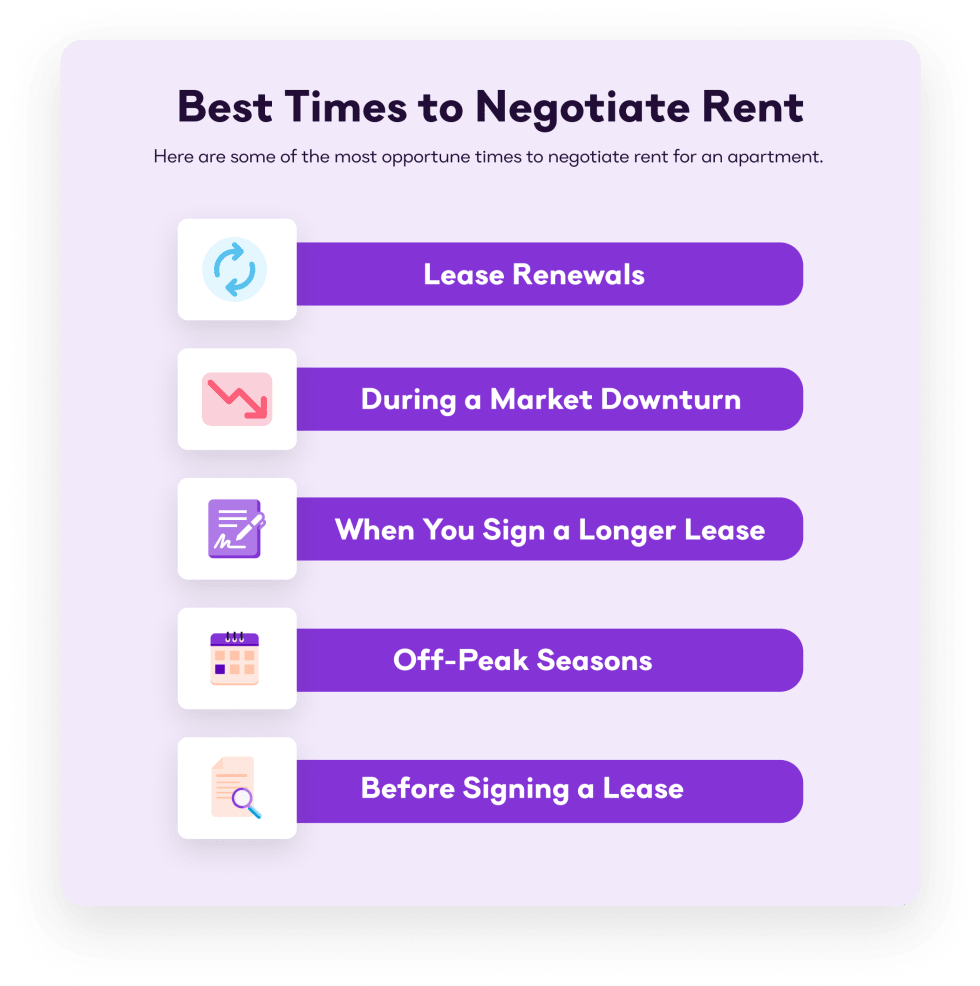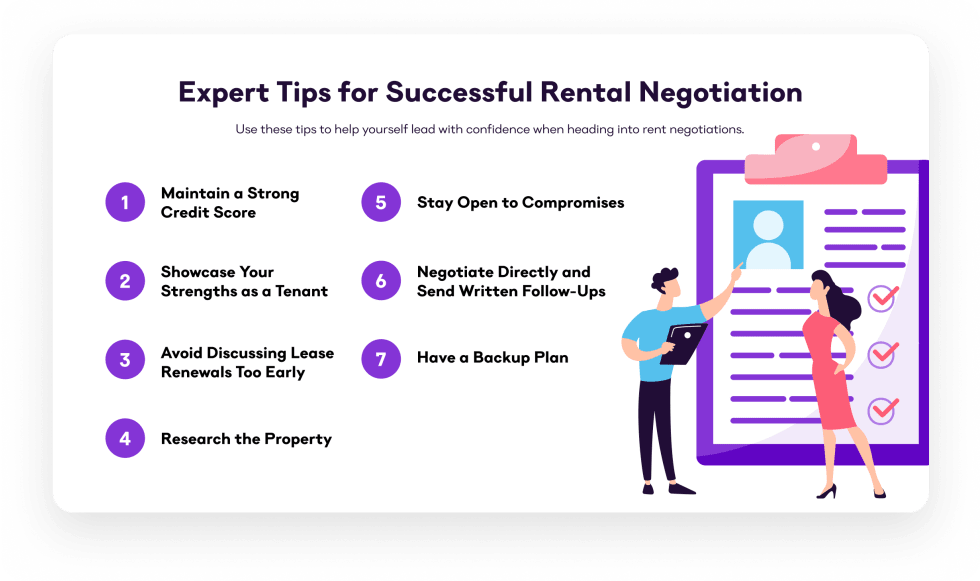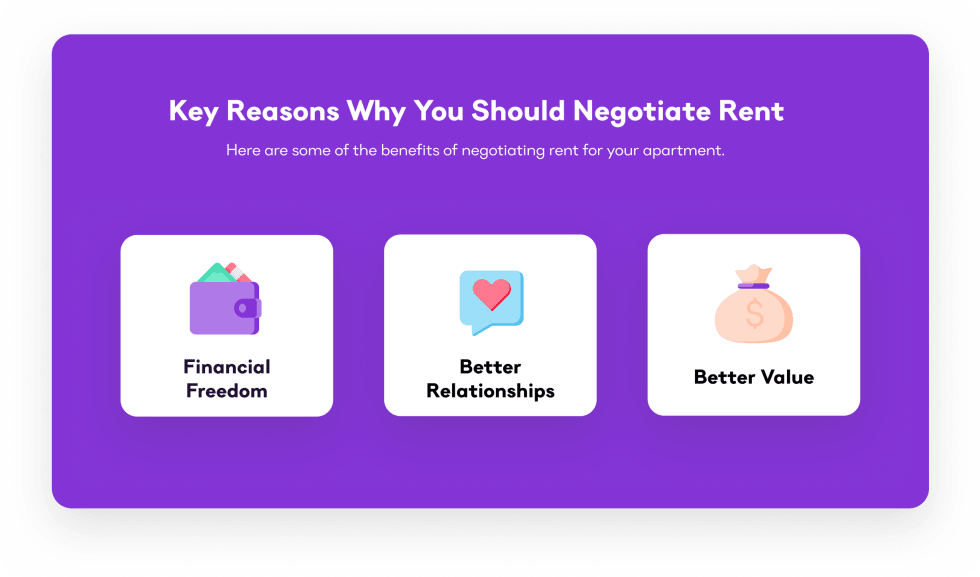Can You Negotiate Rent? 7 Tactics to Lower Rent [2025]

Research shows that of 1,000 homeowners and renters, 69% expect rental prices to climb, making it more important than ever to keep your budget in check. But can you negotiate rent?
As you're about to learn, many renters can and do successfully negotiate rent. These discussions generally happen before you sign a lease or when it’s time to renew at the end of your term. When figuring out how to negotiate a lease, it takes some know-how and confidence to approach your landlord with your case.
Don't worry, we’ve put together everything you need to learn about how to negotiate rent and enjoy more room in your budget. Here’s how to get started.
Guide to Negotiating Apartment Rent
Can You Negotiate Rent?
In fact, rent prices are never set in stone, and it is always possible, though it may be difficult, to negotiate rent. Whether you are successful will generally come down to how much competition there is within the rental market in the area, and how desirable you are as a tenant to your landlord.
In a tight market with a lot of applicants, there may be little point in attempting negotiations because the landlord can just select another applicant who is willing to pay the price they are asking. However, if you know you have leverage to negotiate with, then keep reading.
How to Negotiate Rent Step-by-Step
Even if you already believe you have a strong case for paying less, you still need to know how to negotiate apartment rent calmly and professionally.
1. Make Your Move Under the Right Circumstances
In order to be able to successfully negotiate, your landlord must see you as a desirable tenant. That's more likely to happen if they need to rent out the space urgently, so your best bet is to look for apartments that are move-in ready. The longer those units sit on the market unfilled, the more concessions the landlord is probably willing to make in order to find a tenant.
Also, the winter is the slowest season for new leases. So if your current lease ends during the winter, you can take advantage of the seasonality of apartment renting to negotiate rent. Also, if you do end up moving in the winter, you’ll avoid the peak rush.
2. Do Your Research
You want to come to negotiations armed with as much information as possible about the rental market in your area:
- Find the average rental price in your area either by looking online or using Apartment List's rent estimates database, which we update monthly. It has average rental prices for hundreds cities across the U.S. by number of bedrooms.
- Look locally to get an idea of the price range of rental units in your immediate area to help determine how much you could save through rental negotiations.
- Talk to private landlords in your area to get a feel for how they price their units.
- Understand the amenities offered at your apartment and try to get a sense of whether these justify the current price of the rental unit.
- Look for something to leverage. Negotiations always go more smoothly when the other party has a reason to compromise. If your apartment has low occupation, for example, a landlord might be more willing to lower rent. Talk to neighbors and learn about the property before sitting down with a landlord.
When negotiating rent with a property management company, these numbers will help strengthen your case (and confidence).
3. Prepare an Outstanding Application
Your rental application should convince your landlord or property manager that you are the best possible tenant for the unit.
You'll need to spend time gathering the necessary materials to ensure that your rental application stands out. Reference letters, a cosigner and/or enough income, and a high credit score are all elements that will boost your rental application and improve your chances to negotiate lower rent.

4. Build a Factual Case
Your case should be built on facts about the rental market as well as proof of your outstanding history as a tenant. To build a factual case, make sure to
- Print out the layouts of apartments in other local buildings offering better rent prices.
- Keep your rent payment records on hand if you’re the ideal tenant who always pays on time.
- Bring any documentation you have about your rental and credit history.
- Bring a letter of reference from a previous landlord.
- Have details about the property on hand (i.e. square footage, amenities, walkability, etc.).
- If you've been in your apartment for a long time, bring documents charting any history of rental increases you've experienced while living there.
- Stick with facts related to fair market value, but offer personal context when it's appropriate. For instance, if a significant life event out of your control has caused you to reevaluate your budget (such as a healthcare issue or the need to take in an ailing family member), you should bring it up to explain why you're seeking a reduced payment. But don't let this be your main argument for your landlord should negotiate. Instead, return to a discussion of fair market value and cite personal circumstance as a reason why you might have to relocate to a cheaper, nearby property.
Documents, correspondence, and a little market research can build a better foundation for negotiating lower rent.
5. Make Concessions
Negotiating is a give-and-take process. You should be willing to offer something in exchange for a better rate. Here are some concessions you might suggest in exchange for a reduced rent payment:
- Pay rent ahead of time (offer as many months as you can reasonably afford).
- Sign a longer lease. The standard is twelve months, but it's very common for apartments to offer better rates for individuals who sign for 14 months or longer.
- Agree to a unit that hasn't been renovated yet. If your apartment is undergoing renovations, you can ask about a unit that has not been upgraded, and if you can sign a lease for it in exchange for a lower rate.
- Ask about becoming an apartment attendant. In some complexes, you can take on small tasks in exchange for a reduction in rent. For instance, many apartments select people to do odd jobs such as cleaning and closing a pool after hours in exchange for lower monthly rent.
6. Be Polite & Offer a Meeting
When you reach out to your landlord the first time, do so over email, and let them know what you are writing about. Be polite, and explain clearly your reasons for wanting a change to your monthly rent. Provide them with any documentation you have, and let them know you would be open to meeting in person.
Remember, remain respectful and confident, but don’t apologize about getting in touch or asking for what you want.
7. Explain the Ways Your Landlord Will Benefit
When your landlord reaches out to your for more information or to schedule a meeting, develop your case even further by focusing on how negotiating rent could benefit everyone involved. This is where doing your research on the property is important. If you know that your landlord is incentivized to keep you as a tenant, it makes this step a lot easier. You may be asking them to settle for less rent, but you’re also signing on for another 12 months. Remind them that they won’t have to spend money and time to advertise the unit or turn over the apartment.
Rent Negotiation Email Template
Dear [Landlord Name],
I'm writing to inquire about the possibility of negotiating the rent for my apartment, unit number [Your Apartment Number]. I've been a resident here for [Number] years and have always enjoyed living in this building. I appreciate the [Specific positive aspects of the apartment or building you appreciate] and consider myself a responsible and reliable tenant, consistently paying rent on time and maintaining the apartment in good condition.
However, after careful consideration, I believe the current rent of [Current Rent] is no longer in line with the current market value for comparable units in the neighborhood. My research indicates that similar apartments with [List specific features of your apartment] are currently renting for [Range of comparable rents].
Given my history as a responsible tenant and the current market trends, I respectfully request a rent reduction of [Your desired percentage or dollar amount reduction]. This revised rent of [Your proposed rent] would be more aligned with the market value and allow me to continue enjoying my residency here.
I understand that you may not be able to meet my exact request, and I'm open to discussing options that could be mutually beneficial. I'm available to meet with you at your convenience to further discuss this proposal and find a solution that works for both of us.
Thank you for your time and consideration. I look forward to hearing from you soon.
Sincerely,
[Your Name]
When to Negotiate Rent
You may feel stressed about your current rent and finances, but timing largely determines how successful your negotiations are.
- Before Signing a Lease: Negotiations can also occur before you sign a lease. If you're a new tenant, you might be able to negotiate rent based on market trends or specific issues with the property.
- Lease Renewal: The end of a lease term is usually the most opportune time to negotiate the rent. You may discuss the terms for the next lease period and negotiate a better rate then. Landlords typically prefer to retain good tenants over finding new ones.
- During a Market Downturn: In a rental market slump, landlords may be more open to negotiations rather than risk having their property sit vacant.
- When You Sign a Longer Lease: If you're willing to commit to a longer lease term, landlords might be open to reducing the monthly rent. The certainty of a steady tenant can be worth a lower monthly income.
- Off-peak Seasons: Landlords may be more willing to negotiate during off-peak rental seasons (typically during winter months) when it's harder to find tenants.
Ready to dive in and try to lower your rent? Keep reading to discover our best rent negotiation tips.

What Happens if Your Landlord Rejects Your Offer?
Even if you present a well-researched and compelling offer, there's always a chance your landlord might say no. But don't be discouraged! Here's how to handle a rejection and keep the conversation moving:
Stay Calm and Professional
Avoid getting emotional or accusatory. Remember, you're both trying to reach a mutually beneficial agreement. Thank your landlord for their time and consideration. Show respect for their decision, even if you disagree.
Understand the Reason
Ask politely why your offer was rejected. This could be due to various reasons like market value, other offers, or specific concerns about your proposal. Listen actively and try to understand their perspective. This will help you tailor your next approach.
Don't be afraid to counteroffer if you decided, Based on their feedback, that revising your offer by addressing their concerns or suggesting a compromise would be appropriate. Be prepared to be flexible.
Highlight the benefits for them. Remind them of your strengths as a tenant, like timely payments, responsible behavior, or long-term commitment. Offer alternative solutions. Perhaps a shorter lease term or additional security deposit could be appealing.
Document Everything & Ask for Help if You Need It
Maintain written communication throughout the negotiation process. This creates a clear record of the conversation and avoids misunderstandings.
If you think your landlord's rejection is unreasonable, and you believe you have a very strong case for lowering your rent, then consider seeking advice from a tenant's rights organization or a fair housing agency. They can offer guidance and support specific to your situation.
7 Rental Negotiation Tips
If you’re worried about how to negotiate lower rent, remember you don’t have to stop at monetary cost. You can also negotiate amenities and other perks, like free parking.

1. Maintain a Strong Credit Score
Using your credit score as leverage is an excellent way to negotiate rent. Showing proof that you’ve maintained a strong credit score and are a financially responsible renter will help support your argument for longevity in a unit. A credit score above 750 will help you make the best case.
2. Showcase Your Strengths as a Tenant
Beyond maintaining a strong credit score, review your strengths as a tenant. For example, you can show proof of your on-time payments, open communication regarding maintenance concerns, and flexibility with waiting for repairs.
3. Avoid Discussing Lease Renewals Too Early
The rental market notoriously fluctuates, so discussing lease renewals early may not be in your best interest. The market value of a unit can change daily, so do your best to time your lease renewal and rent negotiations appropriately.
4. Research the Property
National median rent rates fell drastically in many major cities during the pandemic, followed by a peak in cities like Boise and Spokane. As rents level out, you can look in nearby areas or suburbs where rent may be lower. Once you collect your rental data, show your landlord that your rent should be adjusted based on nearby averages.
5. Stay Open to Compromises
If your landlord doesn't agree to lowering rent this time, stay open to other offers they might make. For instance, if they have planned renovations, they may offer to upgrade your apartment ahead of schedule. A free upgrade without an increase in monthly rent might be just as good as a reduction depending on your situation.
If you can afford to stay where you're currently located, then taking a compromise in the first round might help you down the road when it's time to renew the lease.
6. Negotiate Directly and Send Written Follow-Ups
When figuring out how to negotiate rent, it’s tempting to go through a third party to avoid the stress and hassle. But it’s best to negotiate a rent offer directly through your landlord or property manager. You have a better shot at showcasing your value as a tenant and discussing any issues directly and openly when you present your case in person.
7. Have a Backup Plan
You need a backup plan if your rent negotiation fails. Whether you decide to move out or stay and pay the rent increase, you need to know your limits before going into any rent negotiation conversation.
Why Should You Negotiate Rent?
There are many reasons to negotiate rent, starting with flexibility and freedom.

Financial Freedom
Negotiating apartment rent can free up as little as $50 to $100 a month, but that quickly adds up to $600 to $1,200 saved over 12 months. With a little effort, you’ve increased your financial freedom and flexibility just by negotiating lower rent!
Better Relationships
Negotiating rent leaves you more money to spend freely and can improve your relationship with your landlord or property manager. If done respectfully and calmly, negotiating rental prices can be a great way to remind everyone that you’re a good tenant who welcomes confident, proactive communication.
Better Value
If you're trying to figure out when to negotiate rent, it's not always when you move. You can also enter rental negotiations when your lease is up for renewal to get better value.
When the average rent in your area is the same price or lower than your current rent, landlords are more motivated to negotiate to keep you as a tenant. Otherwise, they risk paying for turnover costs like repainting and advertising the unit.
Ready for a New Apartment?
So, is rent negotiable? For sure! But remember, your landlord or property manager is running a business, so it’s your responsibility to convince them to lower your rent. Make sure to outline ways your negotiation benefits your landlord to build confidence and clarity during your conversation about getting cheaper rent.
Ready to find the perfect place for you at the best possible price? Sign up with Apartment List now to find the right apartment for your budget. With us, you’ll spend 5 minutes and save 50 hours searching.
FAQs about Negotiating Apartment Rent
Is it OK to haggle on rent?
In general, it's perfectly appropriate to negotiate rental prices, though how successful you are will depend on the situation. If you are one of many applicants, then it may not be the right time to try to haggle rent. If, however, you're considering a unit that needs to be filled urgently and has no other applicants, you're in a better position to raise the issue.
What time of year is rent the cheapest?
The winter is generally the best time to score a deal on rent because it is usually the slowest time of year for landlords. While your ability to find a good deal will vary based on the desirability of the location, it's best to look for deals like move-in special apartments between October and March.
How much should I spend on rent?
It is generally advised that an individual should not spend more than 30% of their income on rent, and not more than 50% overall on household necessities. Check out our guide on how to budget for your first apartment to learn more.
Share this Article





